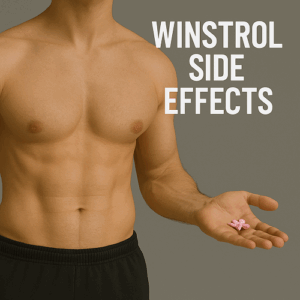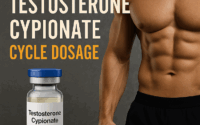Winstrol Side Effects
 Winstrol Side Effects: Understanding the Hidden Costs of a Powerful Cutting Steroid
Winstrol Side Effects: Understanding the Hidden Costs of a Powerful Cutting Steroid
Winstrol, also known by its chemical name Stanozolol, is one of the most popular anabolic steroids in the world. It is widely used for its ability to promote lean muscle growth, enhance strength, and boost athletic performance without the water retention associated with many other steroids. However, despite its popularity, Winstrol carries a range of unique side effects that are often overlooked or underestimated by athletes seeking rapid results.
Understanding these unrepeatable side effects is crucial for anyone considering Winstrol as part of their cutting cycle or strength program. This guide explores the lesser-known, unexpected side effects of Winstrol, helping athletes make more informed and responsible choices.
Uncommon and Overlooked Winstrol Side Effects
1. Tendon and Ligament Weakness
While Winstrol is known for dry, hard muscle gains, it can weaken tendons and ligaments by reducing collagen synthesis and drying out connective tissues. This can lead to:
-
Increased risk of tendon ruptures
-
Joint pain and stiffness
-
Slower recovery from ligament injuries
-
Greater likelihood of muscle strains
This is particularly problematic for powerlifters and strongman competitors who rely on heavy lifting and explosive movements.
Prevention Tips:
-
Supplement with collagen peptides, vitamin C, and gelatin to support connective tissue.
-
Use joint-specific supplements like glucosamine, chondroitin, and MSM.
-
Avoid overloading joints with excessive weight.
2. Joint Dehydration and Loss of Synovial Fluid
Winstrol can reduce synovial fluid production, the natural lubricant that keeps joints moving smoothly. This can cause:
-
Dry, cracking joints
-
Reduced range of motion
-
Bone-on-bone grinding sensation
-
Increased risk of osteoarthritis over time
This side effect is often overlooked because it develops gradually over the course of a cycle.
Joint Protection Strategies:
-
Use joint lubricants like hyaluronic acid and fish oil.
-
Incorporate joint mobility exercises into your routine.
-
Avoid heavy pressing movements if joint pain occurs.
3. Hepatotoxicity and Liver Damage
Winstrol is a 17-alpha-alkylated steroid, meaning it is chemically modified to survive liver metabolism. This increases its oral bioavailability but also stresses the liver significantly.
Potential Liver Problems Include:
-
Elevated liver enzymes
-
Cholestasis (bile flow blockage)
-
Hepatic necrosis (liver cell death)
-
Jaundice and yellowing of the skin
Practical Prevention:
-
Use liver support supplements like TUDCA, NAC, and milk thistle.
-
Avoid alcohol and other hepatotoxic substances during cycles.
-
Regularly monitor liver enzyme levels through blood tests.
4. Severe Acne and Skin Problems
Winstrol can increase sebum production, clog pores, and thicken skin, leading to:
-
Severe cystic acne
-
Oily skin and blackheads
-
Back and shoulder acne
-
Increased scarring if not managed properly
This is a common but often underestimated side effect, particularly for younger athletes.
Skin Health Tips:
-
Use anti-acne face washes with salicylic acid or benzoyl peroxide.
-
Avoid touching your face and keep gym equipment clean.
-
Consider light therapy or chemical peels for stubborn acne.
5. Cardiovascular Strain and Cholesterol Imbalance
Winstrol is known to significantly lower HDL (good cholesterol) while raising LDL (bad cholesterol), creating an unfavorable cholesterol profile.
Risks Include:
-
Atherosclerosis (plaque buildup in arteries)
-
Increased blood pressure
-
Heart attack or stroke risk
-
Reduced vascular flexibility
Heart Health Tips:
-
Use omega-3 fatty acids (fish oil) to support arterial health.
-
Consider supplements like CoQ10, astaxanthin, and niacin for cholesterol support.
-
Incorporate cardiovascular exercise to improve heart function.
6. Bone Density Loss and Skeletal Weakness
Winstrol can reduce bone mineral content over time, potentially increasing the risk of:
-
Osteoporosis
-
Stress fractures
-
Reduced bone density in high-impact athletes
-
Long-term joint pain and skeletal fragility
Bone Health Tips:
-
Include calcium, vitamin D, and magnesium in your supplement stack.
-
Use weight-bearing exercises to strengthen bones.
-
Avoid overloading joints with excessive weight.
7. Hair Loss and Androgenic Alopecia
Winstrol can accelerate hair loss in individuals with a genetic predisposition for male pattern baldness due to its DHT-like effects.
Prevention Tips:
-
Use DHT-blocking shampoos like ketoconazole or finasteride.
-
Incorporate saw palmetto or pumpkin seed oil for natural DHT control.
-
Use scalp massages to stimulate blood flow and reduce hair loss.
8. Immune System Suppression and Recovery Issues
Winstrol can suppress the immune system by reducing lymphocyte production and weakening the body’s defense mechanisms.
Risks Include:
-
Increased susceptibility to infections
-
Slower recovery from illnesses
-
Reduced healing from muscle injuries
-
Autoimmune reactions in extreme cases
Immune Support Strategies:
-
Use zinc, vitamin C, and echinacea to boost immune function.
-
Prioritize sleep and stress management to support immune health.
Conclusion
While Winstrol can be a powerful tool for muscle growth, strength gains, and cutting cycles, it comes with a range of unique risks that extend beyond liver stress and cholesterol imbalance. From joint damage to immune suppression, these unrepeatable side effects can undermine performance and long-term health if not properly managed.


